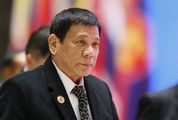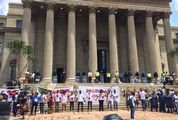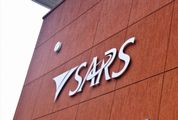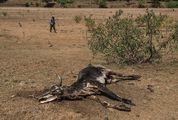Source:

BUSINESS DAY TV: Ascendis Health buys into Farmalider
by Transcript Services, August 5 2015,
2015-08-07 10:52:44.0
KARSTEN Wellner is CEO of Ascendis.
BUSINESS DAY TV: Acquisitions have been a key feature of Ascendis Health’s growth since it listed in 2013 and it continues with today’s news that it is to buy 49% of Spanish group Farmalider with the right to acquire the remainder of the business over the next five years. Ascendis Health CEO Karsten Wellner joins us on the line now.
Karsten… this is clearly part of your plan as you said in the announcement to develop a hard currency revenue stream. You want 30% of your sales from hard currencies over the medium term. But why a firm from one of Europe’s weaker countries economically speaking?
DR KARSTEN WELLNER: Spain has recently shown a very nice increase in its GDP, but even more important for us is the pharmaceutical market, especially the generic pharmaceutical market where we are in has grown on a compounded average growth rate of 13% between 2010 and 2014. But this is definitely the right springboard for us to go into Europe and also into other markets in Latin America, and vice versa offering Farmalider’s products for entry into Africa.
BDTV: What about the actual pricing of the deal? One of my guests in the studio suggested that you got it at a PE of about nine times earnings which is quite reasonable. How is it that you got it so cheaply?
KW: Yes we always had a strategy to be reasonable in what we pay for our acquisitions and especially in pharma’s, it’s not easy to find good targets with a PE below 10 and we are especially proud to have found a very good company at a reasonable price in Europe, and of course with the foreign exchange and the interest differential between Europe and South Africa, it’s very reasonable to pay for a pharmaceutical group below 10 PE multiples.
BDTV: Okay, so the question is why is it so reasonable, why were you able to pick up a company like this so reasonably?
KW: I think its reasonable first because the owners of the business believe in a future together with us and we had decided to actually do a step-by-step approach because we all know we have to be cognisant of the challenges internationalisation is bringing, but we wanted to have a say in ownership, so of course with 49%. But if they’re doing well and they stay in the group until 2020, next year they will get higher multiples over the period and this actually gives us a phasing-in approach for the whole deal so it makes it economically very attractive.
BDTV: Yes, we were talking about that phased-in approach so that you would only acquire 100% of the company by the end of 2020. Are you happy with a kind of five-year view on this acquisition?
KW: Yes, we funded it at the moment from South Africa, but we are in negotiation with a Spanish bank to finance a part of the first tranche, and the second tranche is only required to be paid in January 2017 by which time we can probably also do it out of cash growing out of the profits we are earning in hard currencies. So there’s not a lot of rands outflow with the deal out of South Africa but it opens up opportunities for us to earn hard currency in Europe and that’s actually quite nice for us from the perspective of financing this deal.
BDTV: So will it be earnings accretive immediately?
KW: Yes it is immediately earnings accretive, our headline earnings per share increased by 5.1% with our 49% stake so theoretically if we would have a 100% stake the earnings would have increased more than 10% on our 2014 number. What is actually also nice is that it increases our internationalisation of our business. We reported at half year results around 10% export quota. With this deal on an annualised basis plus The Scientific Group which we bought recently which already has a lot of business in Africa, we probably have on an annualised basis, 15% to 16% revenues outside of South Africa already. So clearly on our road to that international 30% quota that we have always said to the market that we wanted to achieve.
KARSTEN Wellner is CEO of Ascendis.
BUSINESS DAY TV: Acquisitions have been a key feature of Ascendis Health’s growth since it listed in 2013 and it continues with today’s news that it is to buy 49% of Spanish group Farmalider with the right to acquire the remainder of the business over the next five years. Ascendis Health CEO Karsten Wellner joins us on the line now.
Karsten… this is clearly part of your plan as you said in the announcement to develop a hard currency revenue stream. You want 30% of your sales from hard currencies over the medium term. But why a firm from one of Europe’s weaker countries economically speaking?
DR KARSTEN WELLNER: Spain has recently shown a very nice increase in its GDP, but even more important for us is the pharmaceutical market, especially the generic pharmaceutical market where we are in has grown on a compounded average growth rate of 13% between 2010 and 2014. But this is definitely the right springboard for us to go into Europe and also into other markets in Latin America, and vice versa offering Farmalider’s products for entry into Africa.
BDTV: What about the actual pricing of the deal? One of my guests in the studio suggested that you got it at a PE of about nine times earnings which is quite reasonable. How is it that you got it so cheaply?
KW: Yes we always had a strategy to be reasonable in what we pay for our acquisitions and especially in pharma’s, it’s not easy to find good targets with a PE below 10 and we are especially proud to have found a very good company at a reasonable price in Europe, and of course with the foreign exchange and the interest differential between Europe and South Africa, it’s very reasonable to pay for a pharmaceutical group below 10 PE multiples.
BDTV: Okay, so the question is why is it so reasonable, why were you able to pick up a company like this so reasonably?
KW: I think its reasonable first because the owners of the business believe in a future together with us and we had decided to actually do a step-by-step approach because we all know we have to be cognisant of the challenges internationalisation is bringing, but we wanted to have a say in ownership, so of course with 49%. But if they’re doing well and they stay in the group until 2020, next year they will get higher multiples over the period and this actually gives us a phasing-in approach for the whole deal so it makes it economically very attractive.
BDTV: Yes, we were talking about that phased-in approach so that you would only acquire 100% of the company by the end of 2020. Are you happy with a kind of five-year view on this acquisition?
KW: Yes, we funded it at the moment from South Africa, but we are in negotiation with a Spanish bank to finance a part of the first tranche, and the second tranche is only required to be paid in January 2017 by which time we can probably also do it out of cash growing out of the profits we are earning in hard currencies. So there’s not a lot of rands outflow with the deal out of South Africa but it opens up opportunities for us to earn hard currency in Europe and that’s actually quite nice for us from the perspective of financing this deal.
BDTV: So will it be earnings accretive immediately?
KW: Yes it is immediately earnings accretive, our headline earnings per share increased by 5.1% with our 49% stake so theoretically if we would have a 100% stake the earnings would have increased more than 10% on our 2014 number. What is actually also nice is that it increases our internationalisation of our business. We reported at half year results around 10% export quota. With this deal on an annualised basis plus The Scientific Group which we bought recently which already has a lot of business in Africa, we probably have on an annualised basis, 15% to 16% revenues outside of South Africa already. So clearly on our road to that international 30% quota that we have always said to the market that we wanted to achieve.




















Login OR Join up TO COMMENT